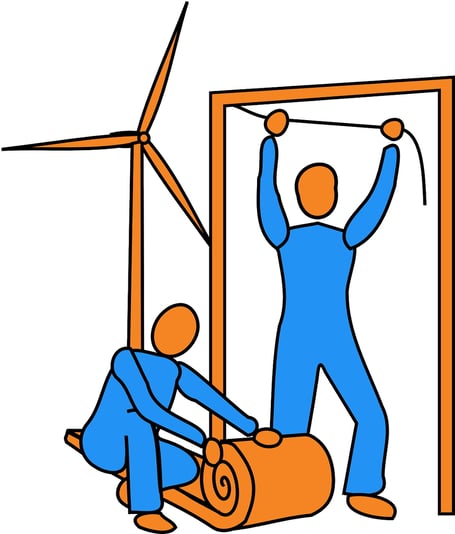THE economic crisis has led to a surge in the cost facing those trying to better insulate their homes, a leading property association has revealed.
The National Association of Property Buyers (NAPB) warned wage rises and a surge in production costs – amounting to up to 20% – mean consumers now face having to find hundreds more pounds.
Spokesman Jonathan Rolande said the rise in price has created an “enormous” task for Ministers committed to improving energy efficiency ratings of homes to Band C by 2030.
Mr Rolande said one answer could be offering tax incentives to landlords in a bid to encourage them to provide better insulation to rental properties.
He says the NAPB would also back a national awareness campaign to highlight the scale of the issue.
His comments come only weeks after Ministers launched a new Government insulation scheme. But Mr Rolande believes this policy drive was “disastrously ill-timed.”
He said: “Whoever decided to launch that campaign in November has serious questions to answer. It was never realistic that rushing to insulate homes in late 2022 was going to work.
“The effects of increased post-pandemic demand, coupled with rising costs and wages in the sector, has made insulating your home a far more costly job now than 12 months ago.
“Much like a homeowner in the Catch-22 situation of being unable to afford the upfront cost of proper insulation and so must bear long term higher bills, the Government must now find more money than it otherwise would to prop up consumers via the Energy Price Guarantee Scheme.”
Outlining the scale of the challenge he continued: “The task is enormous. There are more than 20m dwellings in the UK, and thanks to a mass building spree at the time, around 3m are pre-1900 and more complex to make energy efficient.
“There is also the problem of materials and labour. Insulation companies are booked months in advance and, in a sector where high wages and plenty of work are the norm, wages have rocketed.
“This increase has inevitably been passed on to the consumer.
“The work is skilled, dusty, hot in summer, cold in winter, and the pool of potential employees has shrunk since 2016.
“The materials needed for insulating a home have increased by over 20%, adding to the cost.”
Vulnerable
Pointing towards one solution, Mr Rolande suggested: “The quickest and most beneficial fix would be within the private rented sector.
“Around 5m homes are let in the UK and landlords currently have little incentive to insulate, leaving hard-pressed tenants to foot the bill for heating.
“This is exacerbated by the fact that often, rental homes are within older, less efficient buildings. Often the poorest and most vulnerable people rent their home.
“Landlords are often amongst the wealthier in society. Why haven’t tax breaks to these landlords been offered to give an urgent reason to improve the homes of their tenants?
“The cost would be far less than a full subsidy and the work required to administer it, far less too.
“Well-publicised clarity from the Government is now essential too, in order to explain precisely what the ambitions are and crucially, who will pay for them.
“Landlords need a clear reason to improve their investments.”
Before Christmas Parliament’s Environmental Audit Committee recommended a “war effort” to insulate homes in 2023 – saying officials had failed to take the opportunity “during the warmer months of 2022” when it became clear that consumers would be facing a huge rise in energy costs this winter.
The UK’s housing stock is among the least heat-efficient in Europe.
While the Government has committed in theory to improve the energy efficiency ratings of homes to band C by 2030, the committee said this was “vague and unspecific” without “appropriate interim targets” to measure delivery.
The new Government insulation scheme launched in November was criticised as being too little, too late.
Energy firms, green activists and climate chiefs have united in support of a much bigger effort to urgently insulate millions of homes.





Comments
This article has no comments yet. Be the first to leave a comment.